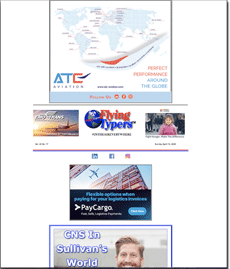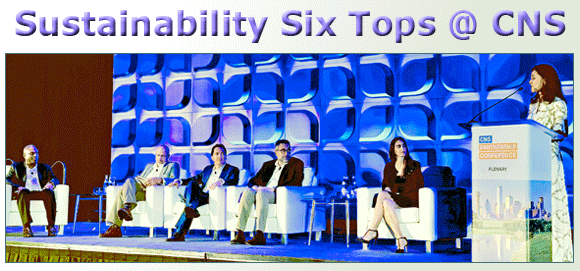 |
All six people on this important panel presentation
held at The Cargo Network Services (CNS) Partnership Conference in Dallas,
Texas that included Alicia Lines, CNS President; (at Podium) and from
right, Cristina Oñate, VP Sustainability & Product, LATAM;
Lorenzo Stoll, Head of Cargo, Swiss WorldCargo; Juan Carlos Serna, Head
of Airfreight, CH Robinson; James Van Epps, Managing Director, Cargo Security,
Customs & DG, Airlines for America; and Robert Horton, Vice President,
Environmental Affairs & Sustainability, DFW International Airport
knocked the ball out of the stadium with an excellent presentation.
Here some edited comments:
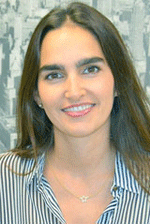 Christina
Oñate VP Sustainability & Product, LATAM declared: Christina
Oñate VP Sustainability & Product, LATAM declared:
 At
LATAM, when it comes to sustainability, we have two main commitments. At
LATAM, when it comes to sustainability, we have two main commitments.
One to be net zero by 2050, and the other
one to use 5% of SAF in our operations by 2030, favoring local productions
in South America.
In order to meet our goals, what we're looking
at is all the different mechanisms that we could use, all the available
tools for decarbonization.
This includes flight and route optimization,
fleet renewal, of course, SAF, and carbon offsets.
LATAM believe that through collaboration,
we could get better results out of all these mechanisms, so we're also
seeking collaboration in each of them.
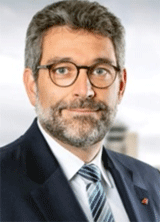 Lorenzo
Stoll, Head of Cargo, Swiss WorldCargo was next outlining
SWISS efforts toward sustainability: Lorenzo
Stoll, Head of Cargo, Swiss WorldCargo was next outlining
SWISS efforts toward sustainability:
 Just as at most airlines of the world in 2024, at SWISS we have the goal
of getting to net zero by 2050.
Just as at most airlines of the world in 2024, at SWISS we have the goal
of getting to net zero by 2050.
We also have a milestone by 2030, to have
cut 50% of our carbon emissions compared to 2019.
There are a number of things we are doing
to reach that goal as well.
We all know that the biggest source of carbon
are the aircraft. So we're investing multi-billion budgets into renewing
the fleet.
So we'll be getting our first 350s soon
coming from Airbus.
SWISS changed our short-haul fleet in the
past years to more efficient models, as well.
So that's one thing.
We also try to figure out how do we operate
more efficiently?
If you think every kilo of fuel we don't
burn when we fly a bit more, or about moving dead weight a bit more efficiently,
multiplied by the number of flights, and number of miles, you can end
up with good solutions.
SWISS has developed an approach for all
this that internally is referred to as OP-D.
SWISS looks at all our flight data, everything
else as well to develop patterns and models to improve the next flights.
For example, faced with irregularities,
we know in this industry sometimes you need to cancel flights.
So now when that happens what is the most
efficient aircraft you send out? Maybe not a 320, but perhaps 321 would
make sense.
Currently we use Google data and Google
Cloud and we see the first effects.
As for SAF, we're also looking at technology
and we're working with a company called SynHelion. It's a Swiss startup
coming from the Ecole Polytechnique Fédérale de Sturing,
or the Swiss equivalent of MIT. A bit better because it's Swiss.  (Lorenzo
smiled). (Lorenzo
smiled).
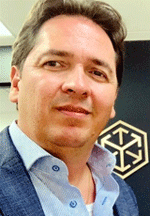 Juan
Carlos Serna, Head of Airfreight spoke of the efforts
of CH Robinson. Juan
Carlos Serna, Head of Airfreight spoke of the efforts
of CH Robinson.
 Our
mission is to improve the world supply chain. And by having more efficient
supply chains across all the elements, we're going to have a more sustainable
supply chain. Our
mission is to improve the world supply chain. And by having more efficient
supply chains across all the elements, we're going to have a more sustainable
supply chain.
I think we're moving west of the supply chain.
It's going to allow us to have a more sustainable one.
And in that, we're working on a multi-dimensional
approach. Certainly, we at CH Robinson, we had committed, and we announced
that we wanted to reduce our emissions impact by 2025 by 40%.
In 2023, we were proud to announce that we had
reduced by 47%, and we're not stopping there.
James Van Epps, Managing Director,
Cargo Security, Customs & DG, Airlines for America
said:
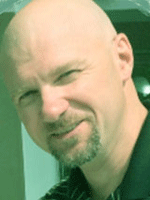
 I
think the nature of this industry in general is so diverse and dynamic
to begin with that there's not a section of the world that we don't touch.
And so from that nature of the industry itself we're dynamic and diverse. I
think the nature of this industry in general is so diverse and dynamic
to begin with that there's not a section of the world that we don't touch.
And so from that nature of the industry itself we're dynamic and diverse.
Where I think where we need to kind of help ourselves
is we need to, I guess I would challenge everybody in this room, sometime
in the next three months, there's a college or university probably within
10 to 20 miles of where you live, to reach out to that university and
actually talk with them to see if you can just present on the air cargo
industry or the airline industry and just on how their skill set or their
degree would apply to the industry itself.
We need to help ourselves in attracting that
talent in to come up with the new ideas and everything else in regard
to being able to bring it all together for achieving the sustainability
that we've been talking about.
Robert Horton, Vice President,
Environmental Affairs & Sustainability, DFW International
noted that the host of the 2024 CNS Partnership Conference is, was and
continues to be proud as the first carbon-neutral airport in North America
eight years ago, achieving that goal in 2016.
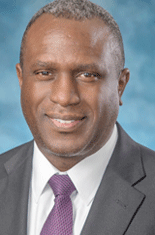 “We are committed to net-zero carbon emissions
by 2030.”
“We are committed to net-zero carbon emissions
by 2030.”
Here are his remarks added to the others as the
result of a battery of excellent questions and follow-ups posed to Robert
and all the panelists here by CNS President Alicia Lines who, it must
be said, conducted a bravura session, easily we think, the best public
conversations at CNS Partnership this year.
“Robert,” Alicia asked, “would
you kindly” share with us a bit of the roadmap DFW has designed
to be able to get to that very ambitious net zero carbon goal by 2030?”
“DFW benefited as the state of Texas
deregulated the energy market,” Robert said.
 That
allowed us to make an investment in purchasing 100% renewable electricity
and realizing savings via a 30-year, low-cost arrangement. That
allowed us to make an investment in purchasing 100% renewable electricity
and realizing savings via a 30-year, low-cost arrangement.
Much of what we invested in initially were
things that we control directly, like energy efficiency investments, and
transitions to renewable fuels.
However, things that are outside of our
control were dealt with incrementally, so between 2010, which is our baseline
year, and last year, we reduced our baseline carbon footprint by 81%.
Now we must include other elements in our
strategy including conversion of our central utility plant, which is responsible
for heating, and cooling our campus, to electric, reducing natural gas
use by about 80%.
The U.S. target of 3 billion gallons of
SAP production by 2030 is big.
DFW alone, I think, uses about a billion
gallons with the airlines, annually. That number informs the problem.
DFW is looking to support those initiatives
and also the airline initiatives in two ways. Number one, we're looking
at how do we reduce the unnecessary consumption of jet fuel, whether it
be by taxing time or by looking at putting electrification systems at
the gates?
The second is looking at how do we support
SAP.
So we collect a lot of U.S. cooking oil.
We're looking at converting what is a waste,
organic waste, into sustainable aviation fuels and renewable fuels.
GDA/SSA
|




